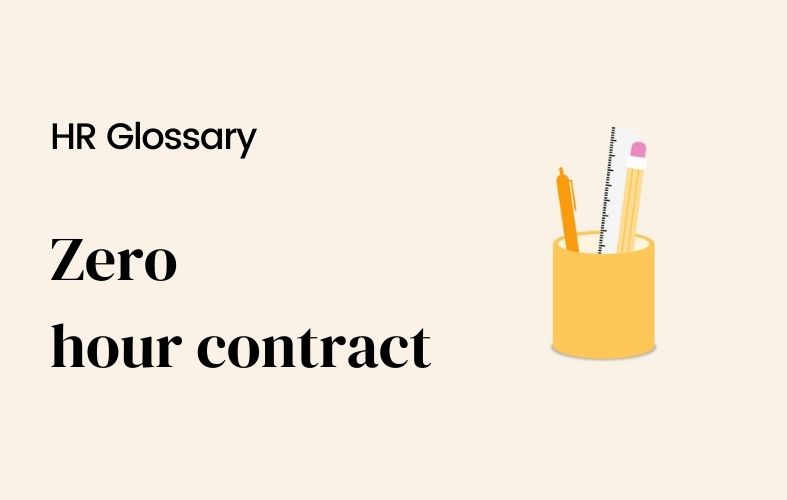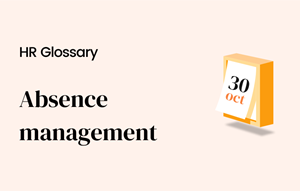Zero hour contract

[Sommaire]
What is a zero hour contract?
A zero hour contract is a type of employment contract where the employer is not obliged to give the employee or worker a minimum number of working hours.
It gives the employee or worker the flexibility to work as little or as much as they want, within the constraints of their availability. These contracts are popular among employers because it allows them to hire workers on a flexible basis as needed.
Likewise, the worker is not obliged to accept any work offered. This makes every zero hour contract very flexible and appealing.
How do you know if you have a zero hour contract?
There are a few key points to look for:
- The workers are not promised a minimum number of hours each week or month.
- Working hours can be canceled with little or no notice.
- When work is only offered at short notice.
- The employer does not have to provide employees work if they do not need them.
A zero hour contract should be clearly stated as such when someone starts working for an organization.
The other indicator of a zero hour contract is that the worker can work as much or as little as they like (should the work be available), and the employer can offer as much or as little work as they need or want to.
When might you use zero-hours contracts?
Zero-hours contracts are widely used in the public and private sectors. They offer a lot of flexibility for employers as they can quickly hire staff when they need them and release them when they do not. This means that zero-hours contracts can be beneficial for:
- Organizations with fluctuating demand - such as hotels, restaurants, bars, and retail businesses.
- Organizations providing services at short notice - such as care homes, blood donation services, and event security.
- Start-up companies - who may not have a clear idea of their future staffing needs.
These contracts are also popular in the retail, care, and agricultural sectors as it is more suited for short-term or seasonal work. However, it should not be used for long-term employment, as it does not offer the employee any stability.
The pros and cons of zero hour contracts
Employers who use zero-hour contracts are very flexible, making them equally popular and controversial.
Here are the pros and cons of zero hour contracts in more detail:
Pros for employers
- Zero hour contracts give employers a pool of labor to call on when needed, such as to support customer demand or cover staff absence. This can improve a company’s productivity and efficiency.
- If there is no work, the employer does not have to pay those workers on a zero hour contract. This can mean a significant saving in wages bills for the employer.
- It is often cheaper to hire workers on a zero hour contract than it is to use a agency. This again helps manage costs.
Pros for workers
- A zero hour contract gives workers the flexibility to fit work around their other commitments such as studying, childcare, or other jobs.
- Zero hour contracts can give people who are unemployed, or who have just left education or been made redundant, the opportunity to work.
- Workers can often earn more money on zero hour contracts as they are able to take on more hours when they are available.
Cons for employers
- Because workers do not need to accept the work offered to them, it may be challenging to get staff to work at short notice.
- The legalities associated with using zero hours contract workers can be confusing. Mistakes may lead to expensive and time-consuming claims in the future.
- There is a potential risk that employees may become unavailable or commit to other work, meaning that the employer may not be able to meet customer demand.
- Workers are entitled to rest breaks, and holiday pay which would not be the case if they were self-employed.
Cons for workers
- A zero hours contract can be unpredictable, making it difficult to know when they will be working and how much money they will be earning. This can have a knock-on effect on a worker’s physical and mental wellbeing.
- Zero hours contracts typically provide a low income for workers. The way some zero hours contracts are set up may mean workers miss out on other benefits such as paid sick leave.
- A zero hours contract provides minimal income security. The employer can stop using a worker without any notice, leaving the worker without any pay.
- Some workers may feel pressured into working when they don’t want to. They may believe they’ll be passed by for future working opportunities. This can lead to working when unwell or tired, which can, in turn, affect productivity and workplace health.
Why are people against the idea of being employed on a zero hours basis?
Although a zero hours contract can be mutually beneficial, some employers have treated zero hours workers unfairly in the past. As a result, some people assume that all these contracts are bad for employees.
People employed on zero hours contracts have been:
- Kept on call without any guarantee of work.
- Given zero hour contracts but expected to be available for work all the time.
- Not given enough notice of their working hours
- Paid less than the minimum wage.
- Expected to work excessive hours without being paid overtime rates.
- Treated unfairly when they try to get a mortgage or other form of credit.
Some employers have used zero hour contracts to exploit workers, which has given it a bad reputation, even though not all zero hour contracts are not automatically bad for workers. Rather, it is the employer themselves who creates the conditions for a positive or negative employee experience.
Some people argue that zero hour contracts are bad for the economy. They say that this employment status stops people from working enough hours to earn a living wage, leading to them needing benefits such as Job Seekers Allowance. This, in turn, would cost the government more money.
Others argue that zero hour contracts offer flexibility to both the employer and the worker as they allow workers to work when they want to, which could lead to more people working. This would then boost the economy as more people are in employment and paying taxes.
Are workers on zero-hours contracts entitled to sick pay?
Yes, zero-hours workers are entitled to statutory sick pay if they meet the eligibility criteria.This is set out in the Employment Rights Act 1996. Workers must have been employed for at least one week to qualify and must earn at least £112 per week.
They must also provide a medical certificate from their doctor if they are off work for more than seven days in a row. zero hour contracts can be beneficial to both employees and employers as they offer flexibility.
However, there are some risks associated with using zero hour contract workers which employers need to be aware of. These include the potential for legal claims and the possibility that workers may not be available when needed. Workers on zero hour contracts are entitled to statutory sick pay.
Some employers may offer sick pay to zero hours contract workers, but this is not mandatory. It is important to check your contract or employee handbook to see what sick pay arrangements are in place.
Zero hour contracts can be beneficial to both employers and workers as they offer flexibility to work when suits them. However, some employers have used zero hour contracts to exploit workers in the past by expecting them to be available all the time, not giving them enough notice, or paying them less than minimum wage.
Do zero hour contract workers have the same rights as other employees?
Yes, zero hour contract workers have the same employment rights as other employees, including the right to:
- Be paid at least the national minimum wage
- Statutory holiday entitlement
- Rest breaks
- Maternity/paternity leave
- Redundancy pay
Some zero hours contracts may offer different rights, so it is important to check the contract before signing.


